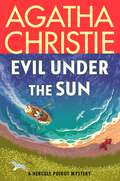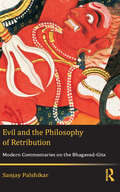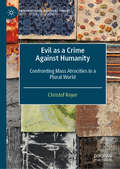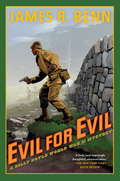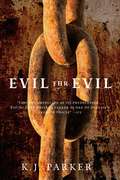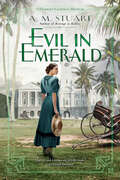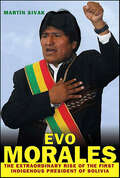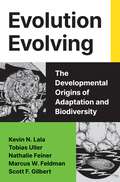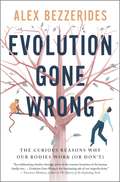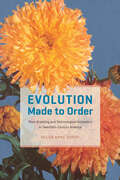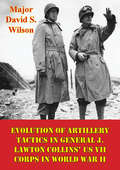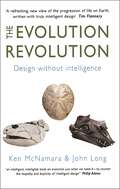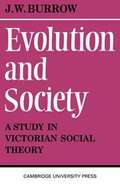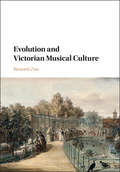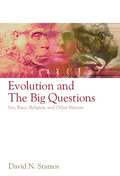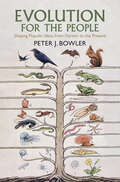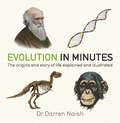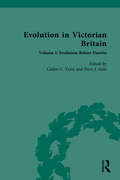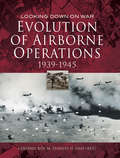- Table View
- List View
Evil Under the Sun: A Hercule Poirot Mystery (Hercule Poirot Mysteries #23)
by Agatha ChristieArlena Stuart, the famous actress, is enjoying-like our favorite Belgian detective Hercule Poirot-a summer holiday on Smugglers' Island, and will become a common enough sight, sunbathing on the hot sands. Then one azure morning her beautiful bronzed body is discovered in an isolated cove, in the shade. She is dead, strangled. And Poirot, as luckless as ever when he attempts some down-time, will learn in the course of his investigation that nearly all the guests of this exclusive resort have some connection to Arlena. But who had the capacity and the motive to kill her?
Evil and the Philosophy of Retribution: Modern Commentaries on the Bhagavad-Gita (100 Cases)
by Sanjay PalshikarWhat is ‘evil’? What are the ways of overcoming this destructive and morally recalcitrant phenomenon? To what extent is the use of punitive violence tenable? Evil and the Philosophy of Retribution compares the responses of three modern Indian commentators on the Bhagavad-Gita — Aurobindo Ghose, Bal Gangadhar Tilak and Mahatma Gandhi. The book reveals that some of the central themes in the Bhagavad-Gita were transformed by these intellectuals into categories of modern socio-political thought by reclaiming them from pre-modern debates on ritual and renunciation. Based on canonical texts, this work presents a fascinating account of how the relationship between ‘good’, ‘evil’ and retribution is construed against the backdrop of militant nationalism and the development of modern Hinduism. Amid competing constructions of Indian tradition as well as contemporary concerns, it traces the emerging representations of modern Hindu self-consciousness under colonialism, and its very understanding of evil surrounding a textual ethos. Replete with Sanskrit, English, Marathi, and Gujarati sources, this will especially interest scholars of modern Indian history, philosophy, political science, history of religion, and those interested in the Bhagavad-Gita.
Evil as a Crime Against Humanity: Confronting Mass Atrocities in a Plural World (International Political Theory)
by Christof RoyerThis book seeks to reimagine why and how to confront mass atrocities in world politics. Drawing on Hannah Arendt’s conception of evil, it interprets and understands mass atrocities as ‘evil’ in an ‘Arendtian’ sense, that is, as crimes against human plurality and, thus, crimes against humanity itself. This understanding of mass atrocities paves the way for reframing responses to mass atrocities as attempts to confront evil. In doing so, the book focuses on military intervention under the banner of the Responsibility to Protect (R2P) and judicial intervention by the International Criminal Court (ICC) and reframes them as tools to protect human plurality from evil. Furthermore, the book looks at the place and the role of R2P and the ICC in the changing landscape of world order. It argues that the protection of humanity from evil can serve as a legitimate Grundnorm (basic norm) around which a global constitutional order in an inherently pluralistic world can be constructed.
Evil for Evil (Billy Boyle World War II Mystery #4)
by James R. BennBenn continues to create fascinating behind-the-scenes mysteries from little-known facets of World War II history. . . . A fast-paced mix of action, adventure, and crime solving. --"Booklist. "
Evil for Evil (Engineer #2)
by K. J. ParkerCivitas Vadanis is in trouble. The Mezentines have declared war; and the Mezentines are very focused on their goals when it comes to killing. Duke Valens, of Civitas Vadanis, has a dilemma. He knows that his city cannot withstand the invading army; yet its walls are his only defence against the Mezentines. Perhaps the only way to save his people is to flee, but that will not be easy either. Ziani Vaatzes, an engineer exiled by the Mezentines for his abominable creations, has already proven that he can defend a city. But Ziani Vaatzes has his own concerns, and the fate of Civitas Vadanis may not be one of them.
Evil in Emerald (A Harriet Gordon Mystery #3)
by A.M. StuartCraving a change of pace, Harriet Gordon, joins a local musical theatre production but when a fellow cast member is brutally killed, Harriet and Inspector Curran must turn the spotlight on murder in this all-new mystery from the author of Revenge in Rubies. Between working at her brother&’s school and typing up Inspector Robert Curran&’s police reports, Harriet Gordon has little time for personal pursuits and she has been enjoying the rehearsals for her role in the Singapore Amateur Dramatic and Musical Society&’s latest production – Pirates of Penzance. But Harriet quickly discovers tensions run deep within the theatre company and when the leading man is found murdered, suspicions abound, exposing scandalous behavior as well as some insidious crimes. Inspector Curran once again turns to Harriet for help with this difficult case, but his own life begins to unravel as a mysterious man turns up on his doorstep claiming to know more about Curran&’s painful past than he himself does. And after the one person he has always counted on delivers him some devastating news, the line between his personal and professional life begins to blur. Now, more than ever, Curran needs Harriet&’s steadfast assistance, and when another cast member meets a violent end, Curran and Harriet will have to close in on a killer determined to make this case their final curtain call.
Evil of the Age: A Thriller
by Allan LevinePolitical corruption, abortion, and dead body discovered inside a trunk at Hudson depot.The summer of 1871 in New York City is hot and humid. The city is gripped by two seemingly separate events. The first is the discovery of a beautiful young woman's body stuffed inside a trunk at the Hudson railway depot. The second involves Victor Fowler, grand sachem of Tammany Hall, and the "Boss" of what is popularly referred to as "The Ring." This is a small clique that includes Governor "Dandy" Archibald Krupp, Fowler's man at the state assembly in Albany; Mayor Thomas "The Prince" Emery, an opportunist of the worst variety; "Slimy" Bob James, the cunning and sly city comptroller; and Isaac "The Wizard" Harrison, the City Chamberlain, who is possibly the most treacherous of the "Ring Rascals."In Evil of the Age, New York journalist Charles St. Clair, tracking down the story of Lucy Maloney, the "kept woman" found murdered and stuffed in a trunk at the Hudson railway depot, moves from the mansions of Fifth Avenue to the brothels of SoHo to the seedy and dangerous saloons on Water Street. St. Clair soon uncovers Lucy's connection to a ring of abortionists and to Madame Philippe, a wealthy woman who known as Madam Killer.St. Clair confronts Madame Philippe at the Tombs prison, where she awaits the hangman's noose for Lucy's murder. St. Clair believes her to be innocent and sets out to prove it, discovering deceit at the highest levels of political power and the shocking secret of the "Ring Rascals."
Evita en Europa: Un viaje iniciático. La construcción del mito
by Guillermo Enrique D'Arino AringoliComparte la aventura que trasformó a María Eva Duarte de Perón en un mito universal: EVITA. <P><P>La vida tan increíblemente cambiante y novelesca de la señora María Eva Duarte de Perón daría un giro fundamental, a principios de1947, cuando llega una invitación oficial del general Francisco Franco al general Juan Perón para que visite España, después de iniciada la ayuda material propiciada por el nuevo gobierno del presidente argentino. <P>Ella no dejaría pasar esta oportunidad. De este modo, con extrema audacia, y al mismo tiempo venciendo sus propios temores, acepta encabezar la gira diplomática por la castigada Europa posbélica. Así, con su frescura habitual, Eva repartirá billetes de cien pesetas a la muchedumbre que delira a su paso. <P>Esta «Gira del Arco Iris», el nombre oficial de la travesía, con sus desplazamientos duraría 78 días visitando España y también Italia, Portugal, Francia, Mónaco, Suiza, Brasil y Uruguay. Se convertirá en su viaje iniciático hasta alcanzar su verdadera transformación interior. <P> Eva volverá del viaje siendo otra. Se fue como la señora de Perón y volverá como Evita; un mito en construcción. La detallada crónica del periplo -poco conocido y estudiado- se enriquece con una serie de 70 fotografías seleccionadas con valor documental. La gira tuvo características que en el mundo de hoy resultarían insólitas. <P>En términos actuales, al finalizar el viaje, Evita se había convertido en una celebrity de alcance mundial.
Evita: Argentina's Heart
by Domenico VecchioniLife, love, political engagement on behalf of her descamisados, the struggle for women’s emancipation, death, second life and the enduring myth of Eva Peron, one of the most remarkable women of the 20th century and one who is still held dear in the memories and hearts of Argentinians.
Evita: Le cœur de l'Argentine
by Domenico VecchioniVie, amour, engagement politique en faveur des descamisados, lutte pour l'émancipation des femmes, mort, résurrection symbolique et mythe d'Eva Perón. Elle est l'une des figures les plus remarquables du XXe siècle, toujours présente dans les mémoires et le cœur des Argentins.
Evo Morales: The Extraordinary Rise of the First Indigenous President of Bolivia
by Martín SivakThe fascinating Bolivian president Evo Morales is vying with the brash and provocative leader of Venezuela, Hugo Chavez, to be the most influential figure in South American politics today. Since coming into office four years ago, Morales has been intensely critical of the United States, speaking out against the drug war at the United Nations and implementing socialist programs at home, including the nationalization of British Petroleum holdings and other foreign investments. And he has reached out to America's political enemies, including Cuba and Iran.Based on personal interviews and unprecedented access, Sivak traces the rise of Morales from his humble origins in a family of migrant workers to his youth as union organizer and explosion onto the national stage.
Evocazioni: Tipici sortilegi statunitensi hoodoo dal 1800 al 1920
by Talia FelixUn vero resoconto della magia statunitense hoodoo e voodoo come veniva praticata in passato. L'arte magica dell'hoodoo é stata incompresa per tutta la sua esistenza. Tramite questo prezioso trattato storico sarete in grado di osservare lo stile genuino degli incantesimi usati dai praticanti del passato, inclusi sortilegi del Doctor Buzzard, di Marie Laveau, Zora Neale Hurston ed altri. Questa nuova edizione è organizzata in maniera conveniente in base allo scopo dell'incantesimo per facilitarne la consultazione. Magie per: SACCHETTI MAGICI, HAND, MOJO & GRIS-GRIS - BOTTIGLIE E FIASCHI - SIGILLI E SCRITTURE SACRE - DANZE - INCANTESIMI D'AMORE - FEDELTA' - MATRIMONIO - SORTILEGI PER RIMUOVERE RIVALI IN AMORE - PER FAR TORNARE AMANTI PERDUTI - INCANTESIMI PECUNIARI - PER VINCERE AL GIOCO - PER AVERE SUCCESSO NEGLI AFFARI - PER OTTENERE UN LAVORO - PER VINCERE UN PROCESSO - PER SFUGGIRE A GUAI LEGALI - USCIRE DI PRIGIONE - EVITARE L'ARRESTO - OTTENERE GIUSTIZIA - MALEDIZIONI, INCANTESIMI PER ARRECARE DANNO E MORTE - BAMBOLINE VOODOO - PROTEZIONE E RIMOZIONE DI MALEDIZIONI - RIMOZIONE DI STREGONERIE E SORTILEGI. Più di 160 incantesimi!
Evolution Evolving: The Developmental Origins of Adaptation and Biodiversity
by Tobias Uller Marcus Feldman Scott F. Gilbert Kevin N. Lala Nathalie FeinerA new account of the central role developmental processes play in evolutionA new scientific view of evolution is emerging—one that challenges and expands our understanding of how evolution works. Recent research demonstrates that organisms differ greatly in how effective they are at evolving. Whether and how each organism adapts and diversifies depends critically on the mechanistic details of how that organism operates—its development, physiology, and behavior. That is because the evolutionary process itself has evolved over time, and continues to evolve. The scientific understanding of evolution is evolving too, with groundbreaking new ways of explaining evolutionary change. In this book, a group of leading biologists draw on the latest findings in evolutionary genetics and evo-devo, as well as novel insights from studies of epigenetics, symbiosis, and inheritance, to examine the central role that developmental processes play in evolution.Written in an accessible style, and illustrated with fascinating examples of natural history, the book presents recent scientific discoveries that expand evolutionary biology beyond the classical view of gene transmission guided by natural selection. Without undermining the central importance of natural selection and other Darwinian foundations, new developmental insights indicate that all organisms possess their own characteristic sets of evolutionary mechanisms. The authors argue that a consideration of developmental phenomena is needed for evolutionary biologists to generate better explanations for adaptation and biodiversity. This book provides a new vision of adaptive evolution.
Evolution Gone Wrong: The Curious Reasons Why Our Bodies Work (Or Don't)
by Alex Bezzerides&“An unforgettable journey through this twisted miracle of evolution we call &‘our body.&’&” —Spike Carlsen, author of A Walk Around the BlockFrom blurry vision to crooked teeth, ACLs that tear at alarming rates and spines that seem to spend a lifetime falling apart, it&’s a curious thing that human beings have beaten the odds as a species.After all, we&’re the only survivors on our branch of the tree of life. The flaws in our makeup raise more than a few questions, and this detailed foray into the many twists and turns of our ancestral past includes no shortage of curiosity and humor to find the answers.Why is it that human mothers have such a life-endangering experience giving birth? Why are there entire medical specialties for teeth and feet? And why is it that human babies can&’t even hold their heads up, but horses are trotting around minutes after they&’re born?In this funny, wide-ranging and often surprising book, biologist Alex Bezzerides tells us just where we inherited our adaptable, achy, brilliant bodies in the process of evolution.
Evolution Made to Order: Plant Breeding and Technological Innovation in Twentieth-Century America
by Helen AnnePlant breeders have long sought technologies to extend human control over nature. Early in the twentieth century, this led some to experiment with startlingly strange tools like x-ray machines, chromosome-altering chemicals, and radioactive elements. Contemporary reports celebrated these mutation-inducing methods as ways of generating variation in plants on demand. Speeding up evolution, they imagined, would allow breeders to genetically engineer crops and flowers to order. Creating a new food crop or garden flower would soon be as straightforward as innovating any other modern industrial product. In Evolution Made to Order, Helen Anne Curry traces the history of America’s pursuit of tools that could intervene in evolution. An immersive journey through the scientific and social worlds of midcentury genetics and plant breeding and a compelling exploration of American cultures of innovation, Evolution Made to Order provides vital historical context for current worldwide ethical and policy debates over genetic engineering.
Evolution Of Artillery Tactics In General J. Lawton Collins’ US VII Corps In World War II
by Major David S. WilsonThis thesis examines the evolution of artillery tactics in World War II using General J. Lawton Collins' U.S. VII Corps as a case study. This study first reviews artillery doctrine and tactics during World War I and during the 1920s and 1930s, in which time future leaders like General Collins were military students.In 1943, General Collins commanded an infantry division on Guadalcanal where he was one of the first American generals to implement the Army's new doctrine of fire direction centers (FDCs) and massed fires using time on targets (TOTs). Collins then was selected to command the U.S. VII Corps for the invasion of Normandy and the subsequent breakout during OPERATION COBRA. From Normandy to the end of the war, Collins continued to hone his use of artillery based on his experience during the eleven-month campaign in Northwest Europe, contributing to his reputation as the best corps commander in World War II.This study looks at Army doctrine in 1944 to judge Collins' artillery tactics and concludes that he used established doctrine and that his tactics are the foundation for today's artillery tactics.
Evolution Revolution: Design without intelligence
by John Long Ken McNamara3.8 billion years ago life evolved. 540 million years ago came the first complex animals. 380 million years ago fish had evolved fins with arm bones that humans have today. So are humans a case study for or against evolution? The Evolution Revolution takes you on a rollicking ride through the past 3.8 billion years of life on Earth exploring the complex and often controversial issue of evolution. Join two of Australia's most accomplished popular science writers, palaeontologists Ken McNamara and John Long, on field trips that unearth some of the world's most significant fossils, from microbes to mighty mammals, including the feathered dinosaurs that make the link between reptiles and birds. The authors take us through the dramatic transition from fins to limbs, how the first insects flew, why dinosaurs got so big and how life has evolved into nearly every nook and cranny on Earth. The major fossil discoveries of the past decade they have documented comprehensively debunk the notion of intelligent design. Like it or not, along with dinosaurs, donkeys and dahlias we too came from bacteria that swam in the primordial soup. Impeccably researched, remarkably readable and punctuated with good humour, The Evolution Revolution puts a human face on the enterprise of palaeontology. It is essential reading for anyone interested in fossils and the big events in life history.
Evolution and Human Destiny
by Fred Kohler"Evolution and Human Destiny" is a methodical examination of the evolution of living matter in general and the development of man and human society in particular. Raising pertinent questions on whether the road of human development will lead steadily upward, or whether it will be interrupted by severe setbacks with all the attendant sufferings for mankind.
Evolution and Society: A Study in Victorian Social Theory
by J. W. BurrowIn this 1966 text Dr Burrow investigates the reasons why Victorian pioneers of social science were habitually approaching the study of other societies with largely positivistic and evolutionary methodologies. As a result of this, anthropology appeared to be seeking affirmation of assumed laws and stages of progress, rather than looking to appreciate and understand other societies in terms of their own uniqueness and functionality. Here, the author not only studies Victorian thought on evolution in general, but also seeks to contextualise those ideas which are often classified as exclusively Darwinist within the studies and writings of other leading figures in Victorian science and social science, whose works often predate The Origin of the Species. His book also makes an incredibly important contribution to the ways in which ideas on evolution and society operated within the framework of general Victorian thought and assumption.
Evolution and Victorian Musical Culture
by Bennett ZonThis engaging book explores the dynamic relationship between evolutionary science and musical culture in Victorian Britain, drawing upon a wealth of popular scientific and musical literature to contextualize evolutionary theories of the Darwinian and non-Darwinian revolutions. Bennett Zon uses musical culture to question the hegemonic role ascribed to Darwin by later thinkers, and interrogates the conceptual premise of modern debates in evolutionary musicology. Structured around the Great Chain of Being, chapters are organized by discipline in successively ascending order according to their object of study, from zoology and the study of animal music to theology and the music of God. Evolution and Victorian Musical Culture takes a non-Darwinian approach to the interpretation of Victorian scientific and musical interrelationships, debunking the idea that the arts had little influence on contemporary scientific ideas and, by probing the origins of musical interdisciplinarity, the volume shows how music helped ideas about evolution to evolve.
Evolution and the Big Questions: Sex, Race, Religion, and Other Matters
by David N. StamosThis provocative text considers whether evolutionary explanations can be used to clarify some of life’s biggest questions. Examines topics of race, sex, gender, the nature of language, religion, ethics, knowledge, consciousness and ultimately, the meaning of life Each chapter presents a main topic, together with discussion of related ideas and arguments from various perspectives Addresses questions such as: Did evolution make men and women fundamentally different? Is the concept of race merely a social construction? Is morality, including universal human rights, a mass delusion? Can religion and evolution really be harmonized? Does evolution render life meaningless? Written in a clear and informative style, with helpful references for further reading and research
Evolution for the People: Shaping Popular Ideas from Darwin to the Present
by Peter J. BowlerFrom Darwin's The Origin of Species to the twenty-first century, Peter Bowler reinterprets the long Darwinian Revolution by refocussing our attention on the British and American public. By applying recent historical interest in popular science to evolutionary ideas, he investigates how writers and broadcasters have presented both Darwinism and its discontents. Casting new light on how the theory's more radical aspects gradually grew in the public imagination, Evolution for the People extends existing studies of the popularization of evolutionism to give a more comprehensive picture of how attitudes have changed through time. In tracing changes in public perception, Bowler explores both the cultural impact and the cultural exploitation of these ideas in science, religion, social thought and literature.
Evolution in Minutes (IN MINUTES)
by Darren NaishHow did life begin? What is the theory of evolution and is it proven? Are we really descended from apes? And has evolution stalled or is humanity just a step on the way to more advanced forms of life?Through 200 mini-essays, expert palaeontologist Darren Naish answers these and many other fundamental questions on the most controversial topic of all. From the theories of Charles Darwin and the Survival of the Fittest to cutting-edge research on consciousness and artificial life, he explains where we came from, how we became human, and what might happen to us next. Immense in scope, and with 200 informative images and diagrams, Evolution in Minutes concisely covers the concepts, rival theories, history and politics of evolution, as well as explaining the development of life across deep time as revealed by the fossil record, from the earliest bacteria via dinosaurs and Neanderthals to humankind - and beyond.
Evolution in Victorian Britain: Volume I: Evolution Before Darwin
by Piers J. Hale Caden C. TestaThis volume provides the readers with a broad but detailed consideration of a wide array of transmutationist thinkers who published before Darwin. Highlighting some of those whom Darwin later acknowledged as well as number he chose not to, readers are shown that the notion that none of these earlier thinkers offered a well-developed or workable theory of evolution is untenable once we read their own words. Further, we will quickly see that transmutation, or the ‘developmental hypothesis’ as it was also sometimes called, had a wide audience across the period under consideration.Scholars such as Adrian Desmond have already drawn attention to the political radicals in the London and Edinburgh medical schools who embraced the transmutationist ideas of the French anatomists Etienne Geoffroy Saint Hilaire and the naturalist and zoologist Jean-Baptiste Lamarck, and the historians John van Wyhe and Roger Cooter have highlighted the materialist naturalism of phrenologists whose work was so amenable to developmentalist thinking. Paul Elliott has drawn our attention to the “Derbyshire Darwinians,” who championed the transmutationist and egalitarian Enlightenment ideas of Erasmus Darwin, Charles Darwin’s grandfather — as well as the extent to which the Derby Philosophical Society was a breeding ground for this kind of thinking. It was here, for instance, that the young radical journalist Herbert Spencer spent many hours in his formative years.Thus, while Darwin was quietly working away at his big species book, transmutation was being discussed and debated, written about, and advocated across the nation. The book he eventually published in 1859, On the Origin of Species, was thus a contribution to an already very lively, controversial, contested, and ongoing debate. However, Darwin had not intended to published Origin as we know it; it is in fact only what he called a brief abstract of the detailed multi-volume work he had initially had in mind. It was upon receipt of a short essay from the naturalist and collector Alfred Russel Wallace that Darwin was pressed to publish. In this short paper Wallace had quite independently arrived at a theory of species development that was remarkably similar to that which Darwin had been working on for some twenty years.
Evolution of Airborne Operations, 1939–1945 (Looking Down on War)
by Colonel Roy M. Stanley IIThe development of air transport in the early 20th Century led military strategists to examine the concept of inserting light infantry at key points behind enemy lines by air landing and air drop.The Germans were first off-the-mark with assaults in Norway and at Eben Emael in 1940. Crete saw a larger scale attack but while ultimately victorious the cost of men and equipment involved deterred any further Axis operation.The Allies on the other hand developed the concept dramatically with the large scale operation HUSKY in Sicily. While only partially successful there was massive loss of life and aircraft airborne operations were a key, if relatively minor, element of Op OVERLORD The D-Day Invasion.The most famous airborne operation was the large scale but ill-fated MARKET GARDEN. Almost successful the Arnhem battle goes down as a heroic defeat. The culmination of WWII airborne operations was the multi-division Rhine Crossing VARSITY.Expert author and collector Roy Stanley traces the history of airborne landings in words and pictures.
